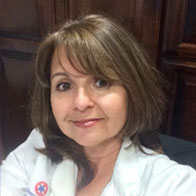Registered Nurse to Bachelor of Science in Nursing Online
Advance your nursing career with the CCNE-accredited RN-BSN program from a top public college of nursing. Cultivate the skills you need to excel as a nurse and create a lasting impact in healthcare.
Home > Online Programs > Registered Nurse to Bachelor of Science in Nursing
Program Overview
Take your career to the next level with UTA’s online RN-BSN program
As a nationally recognized leader in nursing education, the UTA College of Nursing and Health Innovation offers an online RN to BSN program that builds on your registered nursing experience. The program integrates research-based nursing science, principles of nursing leadership and a liberal arts foundation. Highly invested faculty teach you how to implement globally focused and culturally appropriate strategies for health promotion and disease prevention across the lifespan, while you develop strong decision-making and leadership skills.
The CCNE-accredited RN to BSN program includes all required and general courses needed for graduation. Clinical requirements are met through application-based assignments completed in your workplace. Our program also prepares you for the NCLEX, with UTA boasting a 96% first-time pass rate.
The online BSN program allows you to continue your healthcare education while balancing professional and personal responsibilities. Apply online now, regardless of how many general courses you have completed. This unique and cost-effective online format is the most efficient way for registered nurses with an associate degree or diploma to earn a BSN degree.
Becoming a BSN-prepared RN can help you:
- Define your nursing practice
Develop a personal framework for your professional nursing practice - Make confident decisions
Enhance your healthcare decision-making and critical-thinking skills - Meet critical nursing demand
Strengthen your nursing leadership and management skills to meet today's healthcare challenges - Tailor patient care, meaningfully
Apply a systematic approach to comprehensively assessing individuals, families and groups including physiological, psychosocial, cultural and spiritual beliefs - Excel by leveraging impactful data
Utilize evidence-based data to strengthen and improve client care outcomes through comprehensive, efficient and cost-conscious patient care
Notably accredited by the CCNE, the program prepares you for roles, such as:
- Public Health Nurse
- Care Coordinator or Navigator
- Case Manager
- School Nurse
- Health Educator
- Charge Nurse
- Public Health Nurse
- Care Coordinator or Navigator
- Case Manager
- School Nurse
- Health Educator
- Charge Nurse
State Authorization
Residents of certain states may not be eligible to enroll in all UTA accelerated online programs. See program map for details. Currently enrolled students who reside in ineligible states will need approval to continue uninterrupted in their programs in accordance with applicable state laws. Approval is not guaranteed.
Also available:
UTA offers a wide variety of nursing programs online. Check out all of our online nursing programs.
Not looking for an online program?
We also offer this program on campus!Accreditation
The baccalaureate, master's and Doctor of Nursing Practice degree programs and the post-graduate APRN certificate program in the College of Nursing and Health Innovation at The University of Texas at Arlington are accredited by the Commission on Collegiate Nursing Education.
"The online program makes it easy for working nurses and working mothers..."
Shanise McKelvey, RN to BSN online graduate
Explore the convenience and quality of the RN to BSN online program
Tuition
Our budget-friendly tuition can be paid by the course
We understand that it can be difficult to juggle work, classes, life and finances. That's why UTA offers an affordable online education with pay-as-you-go options. Financial aid may also be available for students who qualify.
| Course Type | Per Program | Per Course* | Per Credit Hour |
|---|---|---|---|
| General Courses | - | - | $257 |
| RN to BSN (Nursing Courses) | $8,995 | $771 | $257 |
Tuition Guarantee
Did you know if you enroll now and complete your program without interruption, you can lock in your tuition rate? Read more
Tuition breakdown:

“The program was actually more than I expected. I really am very proud to say I'm a UTA graduate. It really helped to advance my career and myself as a nurse.”
Rose Garcia
UTA RN to BSN online graduate

“The program definitely gives you a nursing foundation.”
Victoria England
UTA BSN online graduate

“I was very anxious and nervous about doing something online. It had been forever since I was in school. I had heard great things about UTA, so I took that first step. I'm glad I did.”
Gina Adair
UTA RN to BSN online graduate
Calendar
Know when to apply, when classes start, when tuition is due
Our RN to BSN online program features multiple start dates to accommodate your busy schedule.
| Course Start | Application Deadline | Document Deadline | Registration Deadline | Tuition Deadline | Session |
|---|---|---|---|---|---|
| 8/18/25 | 7/25/25 | 8/1/25 | 8/13/25 | 8/15/25 | Fall I |
| 9/2/25 | 8/1/25 | 8/15/25 | 8/27/25 | 8/29/25 | Fall I |
| 9/29/25 | 8/29/25 | 9/12/25 | 9/24/25 | 9/26/25 | Fall II |
| 11/3/25 | 10/3/25 | 10/17/25 | 10/29/25 | 10/31/25 | Fall III |
| 1/12/26 | 12/12/25 | 12/19/25 | 1/7/26 | 1/9/26 | Spring I |
| 1/26/26 | 1/2/26 | 1/9/26 | 1/21/26 | 1/23/26 | Spring II |
| 2/23/26 | 1/30/26 | 2/6/26 | 2/18/26 | 2/20/26 | Spring I |
| 3/30/26 | 3/6/26 | 3/13/26 | 3/25/26 | 3/27/26 | Spring II |
| 5/11/26 | 4/17/26 | 4/24/26 | 5/6/26 | 5/8/26 | Summer I |
| 6/29/26 | 6/5/26 | 6/12/26 | 6/24/26 | 6/26/26 | Summer II |
| 8/17/26 | 7/24/26 | 7/31/26 | 8/12/26 | 8/14/26 | Fall I |
| 8/31/26 | 8/7/26 | 8/14/26 | 8/26/26 | 8/28/26 | Fall I |
| 9/21/26 | 8/28/26 | 9/4/26 | 9/16/26 | 9/18/26 | Fall II |
| 11/2/26 | 10/9/26 | 10/16/26 | 10/28/26 | 10/30/26 | Fall III |
| Course Start | Registration Deadline | Tuition Deadline | Session |
|---|---|---|---|
| 8/18/25 | 8/13/25 | 8/15/25 | Fall I |
| 9/2/25 | 8/27/25 | 8/29/25 | Fall I |
| 9/29/25 | 9/24/25 | 9/26/25 | Fall II |
| 11/3/25 | 10/29/25 | 10/31/25 | Fall III |
| 1/12/26 | 1/7/26 | 1/9/26 | Spring I |
| 1/26/26 | 1/21/26 | 1/23/26 | Spring II |
| 2/23/26 | 2/18/26 | 2/20/26 | Spring I |
| 3/30/26 | 3/25/26 | 3/27/26 | Spring II |
| 5/11/26 | 5/6/26 | 5/8/26 | Summer I |
| 6/29/26 | 6/24/26 | 6/26/26 | Summer II |
| 8/17/26 | 8/12/26 | 8/14/26 | Fall I |
| 8/31/26 | 8/26/26 | 8/28/26 | Fall I |
| 9/21/26 | 9/16/26 | 9/18/26 | Fall II |
| 11/2/26 | 10/28/26 | 10/30/26 | Fall III |
Now enrolling:
Ready to take the next steps toward earning your degree?
Admissions
Find your fit for our online RN to BSN program
The College of Nursing and Health Innovation admission process is the first step toward changing your life and enriching the lives of others. Familiarize yourself with these admission requirements, along with information on required documentation.
Admission Requirements
- Online application
- Official transcripts
- Active RN license
- Minimum 2.25 GPA
Online Admission Requirements
- Complete online application and submit application fee
- Proof of active, unencumbered RN license verifiable via Nursys or State Boards of Nursing (BON)
- If the license is unable to be verified, the student must send in a copy of the license for verification via email. Acceptance will be on hold until the license is verified. Use the RN License Upload Form to submit license.
- Students that do not have a license but graduated within 1 year of completion of the ADN program will have the license checklist waived and accepted to the AO RN to BSN program. However, the license will be verified within NURS 3345. If the license is unable to be verified, students will be unable to progress.
- 2.25 Grade Point Average (GPA). Developmental coursework and "D" grades do not transfer.
- TOEFL or TSI may apply.
- The Test of English as a Foreign Language (TOEFL) exam is satisfied by resident status, Associate's Degree, or completion of Composition I and II with a grade of C or better plus 24 additional transferrable hours at a college or university located in the U.S. Otherwise, the Test of English as a Foreign Language (TOEFL) exam is required if the applicant's native or first language is not English. Additional information is available here.
- Completed Texas Success Initiative (TSI). This will NOT prevent admission, but the requirement must be satisfied during the first semester of enrollment.
- Submit official transcripts with record of all courses completed and any degrees conferred by a regionally or nationally accredited institution. Official transcripts are sealed transcripts sent from the granting institution(s).
- Official foreign country transcripts or diplomas must bear the original seal of the institution and the original signature of the Registrar or responsible head of the institution. Those not issued in English must be accompanied by an exact word-for-word original English translation bearing the original university or translation agency attestation. Upon written request, original documents will be returned to the applicant.
Applicants are required to submit all required documents as soon as possible to maintain admission progress:
After the original intended start date on application, a hold will be placed the day after the next start date to prevent students with missing documents from progressing in the program. Transfer Credit Report, Advisement Report, and Degree Map will not be generated for those that have not turned in all required documents. Please contact an Enrollment Specialist at 817-533-3118 or 866-489-2810 for details.
At this time, the program is only open to United States Citizens, Lawful Permanent Residents (Green Card holders), and individuals who hold an H1-B Visa or other valid U.S. work visa.
Official transcripts from all colleges/universities you have attended should be submitted, along with required documents, from the granting institution(s) to:
Electronic Submission (faster processing)
U.S. Postal Service
UTA Undergraduate Admissions701 S. Nedderman Drive
Box 19114
Arlington, TX 76019-0114
Have a question? Call us at 866-489-2810.
Learn more about our admission requirements, review the nursing handbook and policies, and discover tips for success on the UTA College of Nursing and Health Innovation (CONHI) page.
Courses
Take a look at the online nursing curriculum
Undergraduate credit is given for courses listed in the FOSC (Coordinating Board Field of Study Curriculum) guidelines and up to 29 hours credit may be applicable for transfer from ADN or nursing diploma programs. The nursing coursework consists of 32 credits (9 classes). Full-time and part-time options are available.
In addition, students are required to complete 51 credit hours of general education coursework and 9 credit hours of upper-division electives, one of which must be a nursing course. Nursing electives are typically offered in the fall, spring and summer semesters.
All General Courses must be successfully completed prior to entering into the final Capstone Course in the RN to BSN nursing degree program. You may have already completed many of these courses through prior academic work and you may receive credit for classes previously completed. An academic advisor will provide a degree plan once you have applied, submitted your official transcripts, and are accepted by both the UTA College of Nursing and Health Innovation and the University.
Beginning in Fall 2024, ENGL 2338 Technical Writing will no longer be required. Instead, the requirement will be replaced with an upper-division elective.
The current curriculum requires two upper-division electives: one upper-division nursing elective and one upper-division general elective (or a second upper-division nursing elective). With the curriculum change in Fall 2024, there will be three upper-division elective requirements. CONHI recommends that the third elective be NURS 3322 Human Factors in Healthcare; however, students may take a second upper-division nursing elective or a second upper-division general elective.
Additional Information
When you are accepted to any of our online nursing programs, we'll give you access to your nursing degree plan, which indicates which courses you satisfied and which courses you still need to complete, via the MyMav Self Service Student Center.
View upcoming start dates and courses.
1 Tuition is only reflective of the nursing curriculum. Additional coursework, such as general education requirements, may be necessary.
2 If you begin in January or February, you may be able to complete the program in as few as 9 months depending on the courses you transfer into the program. If you begin in any other month, you can complete the program in as few as 10 months.
*Per-course tuition based on 3 credit-hour courses. Tuition may vary by admit term.
Request More Information
Submit this form, and an Enrollment Specialist will contact you to answer your questions.
Or call 866-489-2810
By submitting this form, I am providing my digital signature agreeing that The University of Texas at Arlington (UTA) and its agent, Risepoint, may email me or contact me regarding educational services by telephone and/or text message utilizing automated technology or a pre-recorded message at the telephone number(s) provided above. I understand this consent is not a condition to attend UTA or to purchase any other goods or services. Privacy Policy. SMS Terms.
Ready to Begin?
Start your application today!